Big Boned Read online
Page 11
Cooper, however, is frowning.
“I don’t get it,” he says. “If this is all true, why didn’t the kid tell the cops when they asked him where he was at the time of the murder? Why didn’t he show them the sign-in log?”
“Because,” Sarah says, looking unhappy. “He…he was protecting someone.”
“Who?” I demand. “Who could he possibly—”
“Me, all right?” Sarah can’t seem to lift her gaze from the floor. “He’s…he was protecting me.”
Cooper, with a happy sigh, leans back again in his office chair, causing it to squeak. “And here I thought chivalry was dead.”
“It’s not like that,” Sarah says quickly, lifting her gaze, her cheeks flaming once more. “We’re not—we’ve never—”
I give her a curious look. “But, Sarah—then why else could he be protecting you?”
“I…I’d rather not say,” Sarah says. “Can’t we just bring him the sign-in sheets? Detective Canavan, I mean?”
“What were you doing all night,” Cooper wants to know, “if you weren’t having carnal knowledge of one another? I mean, if you’ll excuse my curiosity? Because I can assure you, Canavan will ask.”
“No, we can’t just bring him the sign-in sheets,” I say testily, in reply to Sarah’s question. “I want to know. What’s Sebastian protecting you from, Sarah? What—”
“And were you actually with him at eight o’clock?” Cooper asks. “You said you signed him out at eight forty-five. But were you with him the entire time from when you signed him in the night before until you signed him out this morning?”
“Would you two,” Sarah shouts, sounding like she was going to start crying again, “stop talking at the same time? It’s so frustrating! You’re like my PARENTS!”
This brings Cooper and me up short. We close our mouths and blink at one another. Parents?
“No, I wasn’t with him the whole time,” Sarah says. “And it isn’t anyone’s business what we were doing—”
“But, Sarah,” I interrupt, getting over the parent thing. Because, whatever. That’s her opinion. And did I mention her frizzies? “You know that when you sign someone in, it’s your responsibility to stay with them the whole—”
“You think you can waltz into the Sixth Precinct and tell them something is none of their business when they ask?” Cooper hoots delightedly. “Because I really want to be there when you do that.”
Then, like a sledgehammer, it hits me.
“The coffeemaker!” I cry, pointing at Sarah accusingly.
Both Cooper and Sarah stare at me as if I’ve begun speaking in tongues. Sarah’s the only one who looks slightly nervous, though.
“I don’t know what you’re talking about,” she says.
“Oh yes, you do,” I say, still pointing at her. “The storage room. Where we sat while we were waiting for the forensics team to get through with our office. I thought the guys from housekeeping were using it as a break room. There was a sleeping bag in there. And a coffeemaker. Someone has obviously been crashing in there. But it wasn’t the building staff. It’s Sebastian, isn’t it? You’ve been signing Sebastian in and letting him live there illegally, haven’t you? Haven’t you?”
Sarah, with a shudder, buries her face in her hands. She doesn’t reply.
But she doesn’t have to. Her body language says it all.
“No wonder Sebastian didn’t tell the cops where he was when Owen bit it,” I go on. “He couldn’t! Because he knew he’d get you in trouble, and you’d lose your job for letting a student live in the building illegally. Sarah! What were you thinking? Have you lost your mind?”
Sarah drops her hands and glares at me.
“It’s not Sebastian’s fault!” she cries. “It was my idea! And it was all the stupid Housing Department’s fault in the first place! He requested a roommate who kept kosher! And what did he get? A California surfer who checked off kosher because it was the more expensive meal plan and he thought that meant the food would be better! He didn’t even know what kosher was. And then when Sebastian went to his hall director to ask for a room change, he was told there was nothing available. What was he supposed to do? Compromise his religious values?”
“No,” Cooper says. “Apparently he preferred to compromise your job instead.”
Sarah inhales so sharply that her breath hitches. A second later, she’s hyperventilating.
Fortunately I find an abandoned Starbucks sack lying nearby and, after pushing her back down on the couch again, force Sarah to breathe into it for a few minutes. Soon she’s breathing normally once more.
Sitting between Cooper and me, staring sadly at the last page of the Victoria’s Secret catalog as Lucy devours it, Sarah says, “I guess I’m the biggest idiot in the world, aren’t I?”
“Not the biggest,” Cooper offers.
“We don’t have to tell them how long you let him stay there,” I say. “We can just say it was for that one night.”
“No.” Sarah shakes her head, so violently that her long, bushy hair nearly whips both of us. “I was the one who was blinded by love. Not even real love, because it’s not as if he cares about me as anything more than a friend. Like a guy like that ever could love a girl like me.”
“Stranger things,” Cooper says dryly, “have happened. Especially after a night or two in the Tombs. He might emerge with a new appreciation for the fairer sex in general.”
I long to elbow him, but Sarah is in the way.
I needn’t have worried. She’s not listening, anyway.
“I abused my power as a resident hall graduate assistant,” Sarah says. “I lied, and took advantage of my sign-in and key privileges. I’ll turn myself in.”
“Not for nothing,” Cooper says. “But to whom? Your boss is dead.”
“Yeah,” I say. “And my inclination is to chalk it up to temporary insanity. Spring fever, as it were.”
“I’ll never speak to him again,” Sarah says. “After we’ve turned over the sign-in log and I’ve given my deposition. And the GSC has gotten the president’s office to cave to all of our demands. And I’ve found him safe but affordable housing elsewhere. And made sure he’s received proper psychiatric counseling for whatever post-traumatic stress he might suffer from all of this.”
“That’s the spirit,” Cooper says, encouragingly.
“Of course,” Sarah says, as the three of us head back toward Fischer Hall to pick up the sign-in sheets and take them over to Detective Canavan’s office, thus speeding the release of the man with whom Sarah claims most emphatically to no longer be in love with. “It would be much better if we could just figure out who really did kill Owen. Not just for Sebastian,” she adds, hastily. “But so everything could go back to normal.” Cooper and I exchange glances.
“Yes,” I say. “It would.”
11
* * *
Walking with my baby in the park
Past the dog run
And the young at heart
“Lucy’s Song”
Written by Heather Wells
* * *
Detective Canavan is less than impressed by the sign-in sheets we present him with forty-five minutes later—possibly because he’s tired after a long day of work, and just wants to go home (welcome to the club).
But also because, as he points out, they don’t exactly represent an iron-clad alibi, since anyone can sneak past a college security guard, shoot an interim residence hall director in the head, then sneak back.
I inform him that his lack of faith in New York College’s crackerjack security force is jarring, a remark to which he responds not at all…except to mention the small matter of the handgun they found in Sebastian’s murse.
“Handgun?” Sarah scoffs. “Don’t be ridiculous. Sebastian doesn’t own a gun. He’s a pacifist. He believes violence is never the answer. It doesn’t solve anything.”
Detective Canavan snorts at this.
“A pacifist who carries around an unlicensed
thirty-eight.”
Since this also happens to be the same caliber bullet that mowed through Owen Veatch’s skull at the time for which Sebastian has no credible alibi, he’s the murder’s number one—and only—suspect. A ballistics test will tell the police if the gun is, in fact, the same one used to dispatch my boss. The sign-in sheets, if anything, only serve to solidify the case against Sebastian, since it gives the NYPD their first solid proof that Sebastian was actually on the premises at the time of the murder.
Um. Oops?
Sarah, when we walk out of the precinct and onto West Tenth Street, has been rendered visibly pale by all of this.
“Look,” I say to her, fearing she’s going to hyperventilate again, and furtively scanning the sidewalks for abandoned paper bags I can force her to breathe into. “It’s going to be all right. I’m sure he’s gotten in touch with his parents by now. They’ll get him a good lawyer. He’ll get arraigned, they’ll post bail, and he’ll be out by tomorrow morning.”
Cooper makes a noise when I say this, but I shoot him a warning look, and he closes his mouth.
“I know,” Sarah says quietly.
“And he’ll be all right overnight in the detention center,” I insist. “Detective Canavan will make sure he gets his inhaler. And his Allegra-D.”
“I know,” Sarah says. Again, quietly. Too quietly.
I glance at Cooper over the top of Sarah’s head. He raises his eyebrows. We both sense it: Something’s wrong. Sarah should be in hysterics. Why is she so calm?
We wait at the corner for an empty cab to come by and take us back to Washington Square. It’s a gorgeous spring evening, and there are a lot of people out and about, couples—both of the hetero and homo variety, some pushing strollers, some not—and singles, some walking dogs, some not, all stylishly attired (it’s the West Village, after all), enjoying the warm weather and twilight sky, strolling by the quaint outdoor cafés with their brightly colored awnings, the expensive home decor shops, the fragrantly scented cupcake bakeries, the specialty condom stores…
Sarah doesn’t seem to notice any of this. She keeps her gaze straight ahead, a faraway look in her eye. When Cooper successfully hails a cab and it pulls up in front of us, but she still doesn’t move, I reach out and pinch her, Muffy Fowler style.
Not hard, or anything. Just enough to get a reaction.
“Ow!” Sarah exclaims, jumping and rubbing her arm. She turns an accusatory gaze up at me. “What’d you do that for?”
“What’s the matter with you?” I demand. “You just found out the love of your life’s a big fat phony. Why aren’t you hyperventilating? Or at least crying?”
“What are you talking about?” Sarah’s eyebrows, badly in need of plucking, are constricted. “Sebastian’s not the love of my life. And he’s NOT a phony.”
“A pacifist who carries a thirty-eight?” Cooper, holding open the door to the backseat of the taxi, looks skeptical. “You don’t find that a bit hypocritical?”
“God, don’t you see?” Sarah lets out a bitter laugh as she climbs into car. “It’s so obvious. Someone planted that gun on him.”
I glance at Cooper as I slide onto the backseat beside her, but he shrugs, obviously as clueless as I am. “Sarah, what are you talking about?”
“It’s clearly a conspiracy,” Sarah explains, as if the two of us are simpletons not to have seen it. “A setup by the president’s office. I don’t know how they did it, but you can be sure they’re behind it. Sebastian would never carry a gun. Someone must have slipped it into his bag.”
“Washington Square West and Waverly,” Cooper says to the cabdriver, as he joins me on the backseat. To Sarah, he says, “I gotta hand it to you, kid. That’s a new one. A conspiracy by the New York College president’s office. Very creative.”
“Laugh all you want,” Sarah says. She turns her face resolutely toward the window. “But they’re going to be sorry come morning. Very sorry.”
I stare at her profile. It’s getting darker out, and harder to see. I can’t tell whether or not she’s kidding.
But then again, she’s Sarah. Sarah’s never been much of a kidder.
“What do you mean, they’re going to be sorry?” I ask her. “What are you talking about?”
“Nothing,” Sarah says innocently. “Don’t worry about it.”
I glance at Cooper. He’s trying not to smile. Although I don’t see anything particularly funny about the situation.
Sarah turns down my invitation to come over for dinner as we pull up in front of Fischer Hall. She says she has a lot of work to do—whatever that means. Cooper remarks when she’s gone that it’s just as well—he’s had as much twenty-something drama as he can take for one day.
“But what could she mean, we’re going to be sorry?” I wonder, as we make our way up the stoop to his front door. “What could she be up to?”
“I don’t know.” Cooper fumbles with his keys. “But it seems to me if she gets out of hand you have a good bargaining tool with the fact that she was letting that kid live illegally in your building. Just threaten to rat her out.”
“Oh, Coop,” I say. “I can’t do that.”
“Why not?” he wants to know. “You’re too soft on them, Heather. What was that whole thing earlier, with my car? Did you really think there was a chance in hell I was going to let them borrow it?”
“No,” I say. “But you’re one to talk. What was that other whole thing in your office earlier, where you were swearing at Sarah, and telling her to get the fuck out? Like you were really going to throw her out. You wouldn’t throw a cockroach out of there. Obviously.”
“Heather, you might not have noticed, but she was completely lying to us.” Cooper manages to get the front door unlocked, then pushes it open. “Do you think we’d have ever gotten the truth out of her if I’d coddled her the way you do?”
My cell phone rings. I pull it out, see that it’s Tad calling, and immediately send the call to voice mail.
Unfortunately, Cooper is standing close enough that he sees who it was. And where I sent the call.
“Trouble in paradise?” he asks, one dark eyebrow quirked.
“No,” I say stiffly. “I just don’t feel like talking to him at the moment.” I follow him inside, throwing my purse and keys onto the same console table in the hallway where he’s thrown his wallet and keys. “The point is, you didn’t have to be that mean to her…”
Cooper turns to look down at me. “Yes, actually, Heather, I did. Sometimes, if you want to get to the truth, you have to push people. It may not be pretty, but it works.”
“Well, we’re just going to have to agree to disagree,” I say. “Because I think you can be nice to people and get the same results.”
“Yeah,” Cooper says, with a snort. “In four years.”
“Sarah’s conscience would have gotten the better of her sooner or later,” I say. “Way sooner than four years. Try four minutes. Which is exactly what happened. And oh my God, what is that smell?”
Cooper inhales.
“That,” he says, in the tone of a man who is well pleased with a discovery, “is the succulent odor of your dad’s braised short ribs.”
“My God.” I am in shock. “That smells delicious.”
“Yeah, well, better enjoy it while you can, ’cause this is the last time we’re gonna get to experience it.”
“Shut up,” I say. “He’s only moving uptown. He’s not dying.”
“You’re the one who couldn’t stand having him around,” Cooper points out, as he hurries toward the back of the house, which is where the insanely good smell is coming from. “I was perfectly content to let him live here forever.”
“Come on.” I can’t believe what I’m hearing as I trot along behind him. “Forever? All that yoga and those aromatherapy candles didn’t bother you? What about the flute playing?”
“When I got to come home to dinners like this? Perfectly forgivable.”
“There you are,” Dad calls f
rom the kitchen. He can hear us as we come down the hallway—but not, I know from experience, what we’re saying. His hearing’s not what it once was, and the walls of Cooper’s brownstone are thick. You can’t beat that nineteenth-century construction. “Stop bickering, you two, and hurry up. Dinner’s ready. You’re late!”
We rush toward the absurdly large (for Manhattan, anyway) skylit kitchen, to find the butcher block table already set, the candles already lit, and the wine already poured. Dad is standing at the counter tossing a salad, wearing a blue and white apron over a button-down shirt, olive green cords, and a pair of Crocs. He brightens when he sees us, as does Lucy, who thumps her tail against the floor in the contented manner of a dog who has already had her evening walk.
“Hello,” Dad says. “So glad you could make it.”
“Sorry we’re late,” I begin. “We had to take Sarah to the police station. It turns out she…”
My voice trails off. Because it turns out we’re not alone with Dad and Lucy in the kitchen. There’s someone sitting at the table with a plate of food already in front of him, although he’s politely refrained from digging in yet. The same can’t be said, however, of his wineglass.
“Heather!” Cooper’s brother, Jordan, slurs, drunkenly raising a glass of wine in our direction. “Cooper! Did you hear the news? I’m gonna be a daddy!”
“I really didn’t have any other choice but to let him in,” Dad explains, much later after dinner, when Cooper has left to drive his brother back to his penthouse on the Upper East Side. “He was very insistent that he see you. And he was, as you could probably tell, in a very celebratory mood.”
Jordan’s mood, if you ask me, was more suicidal. But then, that’s what happens when you find out your wife’s pregnant, and you’re not a hundred percent certain you’re ready for fatherhood.
But that was something Jordan had asked me to keep between the two of us, when he’d trapped me in the hall on my way back from the bathroom during dinner.
“I never should have let you go,” Jordan informed me mournfully as he sandwiched me between his body and the wall.

 Bridal Boot Camp
Bridal Boot Camp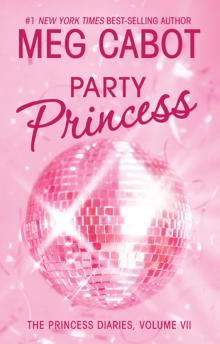 Party Princess
Party Princess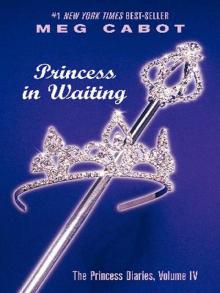 Princess in Waiting
Princess in Waiting Being Nikki
Being Nikki Abandon
Abandon Princess on the Brink
Princess on the Brink Darkest Hour
Darkest Hour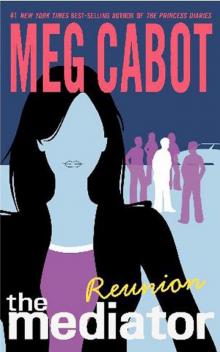 Reunion
Reunion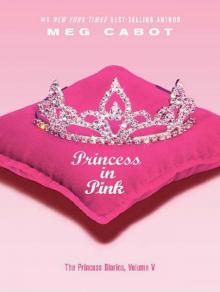 Princess in Pink
Princess in Pink Sweet Sixteen Princess
Sweet Sixteen Princess The Princess Diaries
The Princess Diaries Airhead
Airhead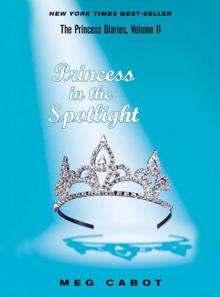 Princess in the Spotlight
Princess in the Spotlight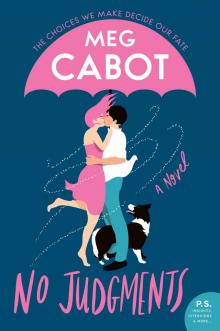 No Judgments
No Judgments All-American Girl
All-American Girl Princess in Love
Princess in Love Forever Princess
Forever Princess Haunted
Haunted Shadowland
Shadowland Twilight
Twilight Princess Mia
Princess Mia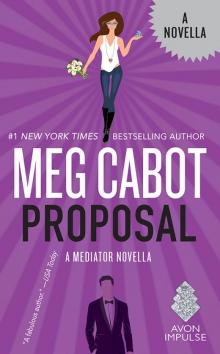 Proposal
Proposal Remembrance
Remembrance Ransom My Heart
Ransom My Heart Underworld
Underworld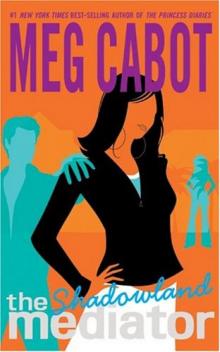 Shadowland tm-1
Shadowland tm-1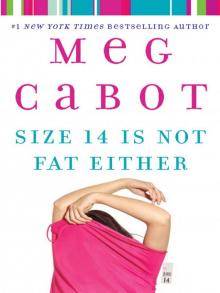 Size 14 Is Not Fat Either
Size 14 Is Not Fat Either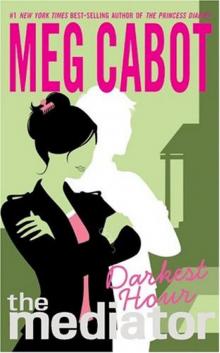 Darkest Hour tm-4
Darkest Hour tm-4 Airhead a-1
Airhead a-1 Royal Crush
Royal Crush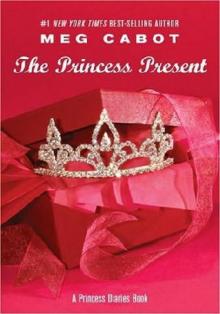 The Princess Present (princess diaries)
The Princess Present (princess diaries)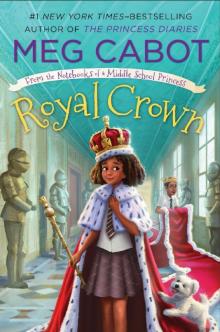 Royal Crown
Royal Crown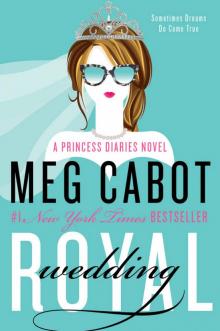 Royal Wedding: A Princess Diaries Novel (The Princess Diaries Book 11)
Royal Wedding: A Princess Diaries Novel (The Princess Diaries Book 11) Princess Diaries, Vol. X: Forever Princess
Princess Diaries, Vol. X: Forever Princess Royal Wedding Disaster
Royal Wedding Disaster Allie Finkle's Rules for Girls: Glitter Girls and the Great Fake Out
Allie Finkle's Rules for Girls: Glitter Girls and the Great Fake Out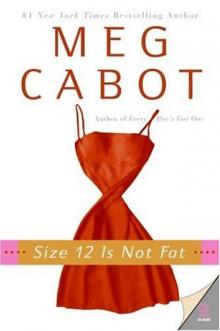 Size 12 Is Not Fat hwm-1
Size 12 Is Not Fat hwm-1 Princess on the Brink pd-8
Princess on the Brink pd-8 The New Girl
The New Girl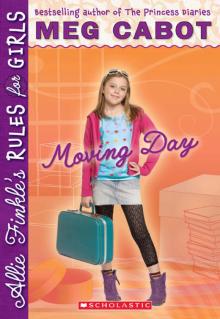 Allie Finkle's Rules for Girls: Moving Day
Allie Finkle's Rules for Girls: Moving Day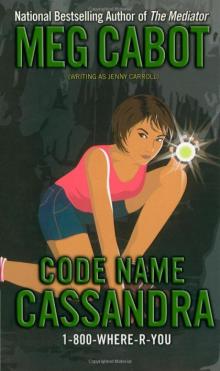 Code Name Cassandra
Code Name Cassandra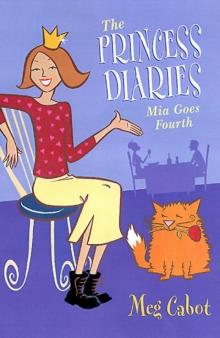 Mia Goes Fourth pd-4
Mia Goes Fourth pd-4 Sanctuary 1-4
Sanctuary 1-4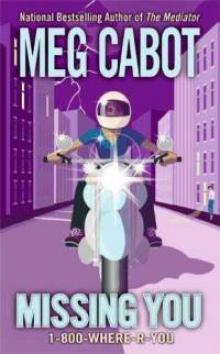 Missing You 1-5
Missing You 1-5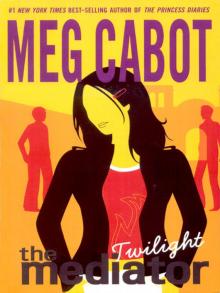 The Mediator 6: Twilight
The Mediator 6: Twilight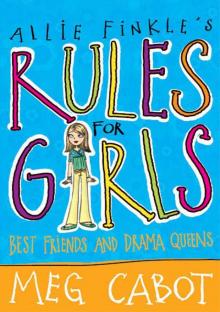 Allie Finkle's Rules for Girls: Best Friends and Drama Queens
Allie Finkle's Rules for Girls: Best Friends and Drama Queens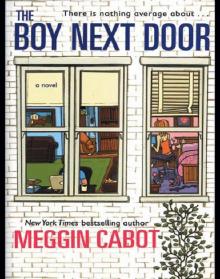 The Boy Next Door
The Boy Next Door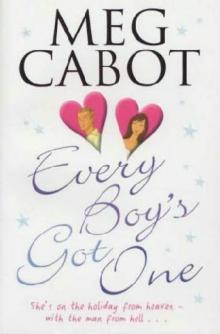 Every Boy's Got One
Every Boy's Got One Princess Mia pd-9
Princess Mia pd-9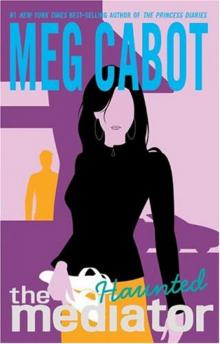 Haunted tm-5
Haunted tm-5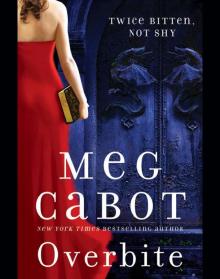 Overbite
Overbite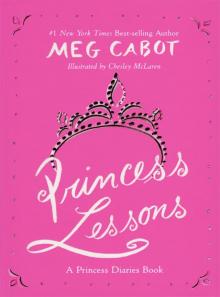 Princess Lessons
Princess Lessons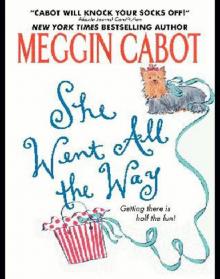 She Went All the Way
She Went All the Way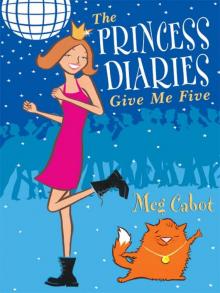 Give Me Five pd-5
Give Me Five pd-5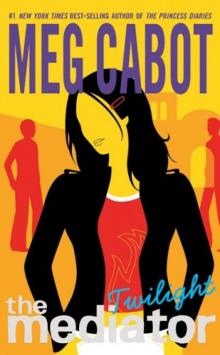 Twilight tm-6
Twilight tm-6 Jinx
Jinx Runaway (Airhead #3)
Runaway (Airhead #3)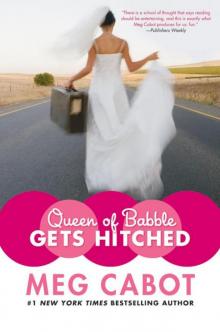 Queen of Babble Gets Hitched qob-3
Queen of Babble Gets Hitched qob-3 Forever Princess pd-10
Forever Princess pd-10 Queen of Babble
Queen of Babble Boy Meets Girl b-3
Boy Meets Girl b-3 Pants on Fire
Pants on Fire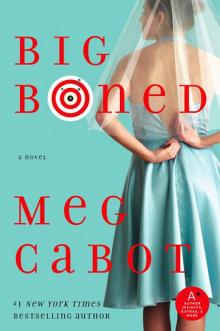 Big Boned ху-3
Big Boned ху-3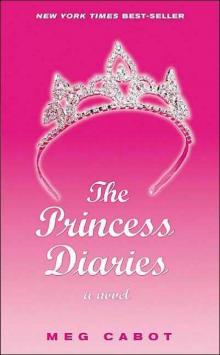 Princess' Diaries pd-1
Princess' Diaries pd-1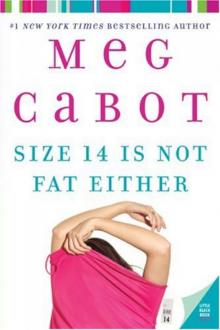 Size 14 Is Not Fat Either hwm-2
Size 14 Is Not Fat Either hwm-2 Awaken a-3
Awaken a-3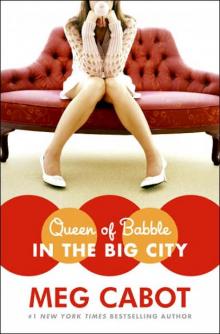 Queen Of Babble: In The Big City qob-2
Queen Of Babble: In The Big City qob-2 Nicola and the Viscount
Nicola and the Viscount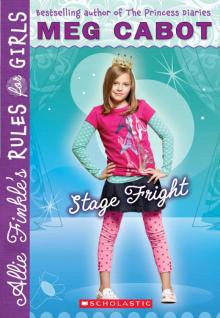 Allie Finkle's Rules for Girls: Stage Fright
Allie Finkle's Rules for Girls: Stage Fright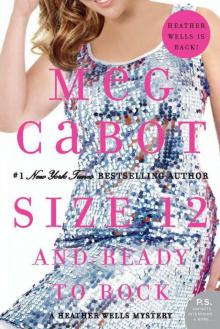 Size 12 and Ready to Rock
Size 12 and Ready to Rock Perfect Princess
Perfect Princess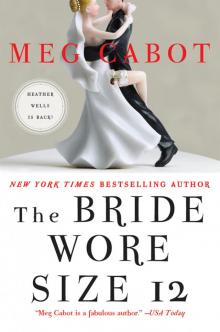 The Bride Wore Size 12
The Bride Wore Size 12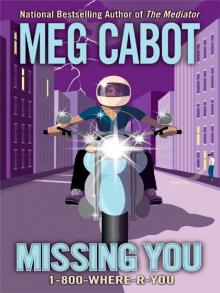 1-800-Where-R-You: Missing You
1-800-Where-R-You: Missing You How to Be Popular
How to Be Popular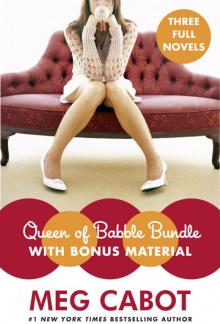 Queen of Babble Bundle with Bonus Material
Queen of Babble Bundle with Bonus Material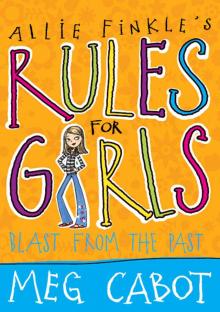 Allie Finkle's Rules for Girls: Blast from the Past
Allie Finkle's Rules for Girls: Blast from the Past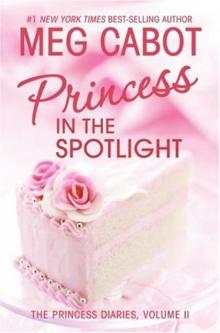 Princess in the Spotlight pd-2
Princess in the Spotlight pd-2 Ready or Not
Ready or Not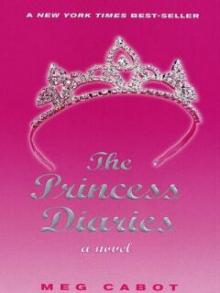 The Princess Diaries I
The Princess Diaries I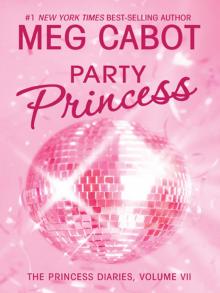 Party Princess pd-7
Party Princess pd-7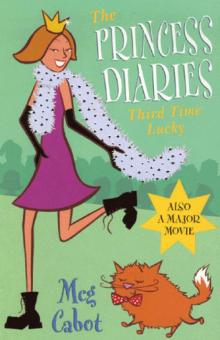 Third Time Lucky pd-3
Third Time Lucky pd-3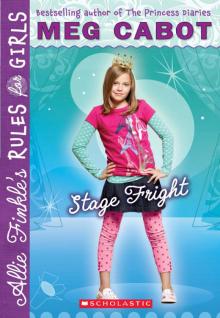 Stage Fright
Stage Fright From the Notebooks of a Middle School Princess
From the Notebooks of a Middle School Princess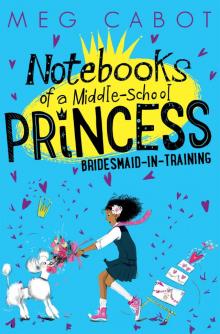 Notebooks of a Middle-School Princess Bridesmaid-in-Training
Notebooks of a Middle-School Princess Bridesmaid-in-Training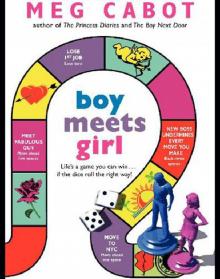 Boy Meets Girl
Boy Meets Girl Missing You
Missing You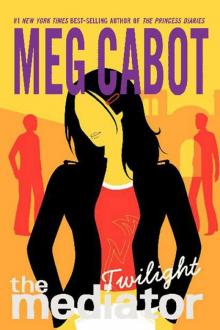 The Twilight
The Twilight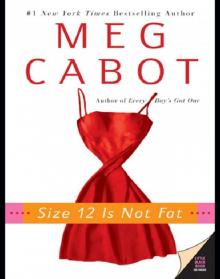 Size 12 Is Not Fat
Size 12 Is Not Fat Code Name Cassandra 1-2
Code Name Cassandra 1-2 Valentine Princess
Valentine Princess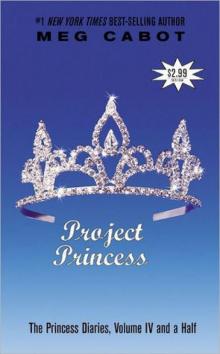 Project Princess
Project Princess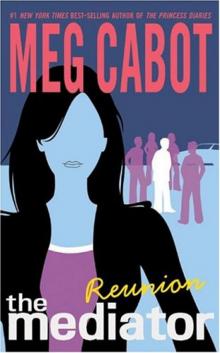 Reunion tm-3
Reunion tm-3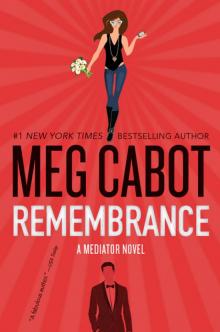 Remembrance: A Mediator Novel
Remembrance: A Mediator Novel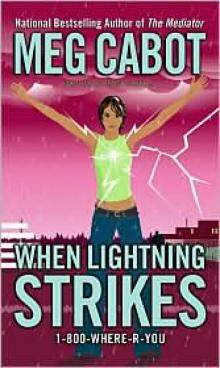 When Lightning Strikes 1-1
When Lightning Strikes 1-1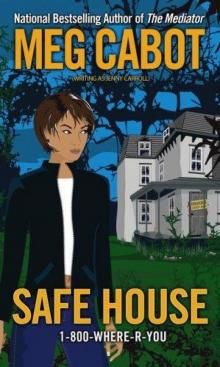 Safe House 1-3
Safe House 1-3 Teen Idol
Teen Idol Queen of Babble Gets Hitched
Queen of Babble Gets Hitched Glitter Girls and the Great Fake Out
Glitter Girls and the Great Fake Out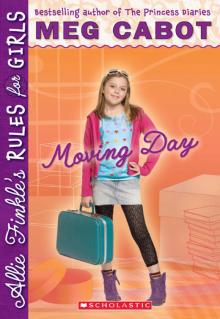 Moving Day
Moving Day Insatiable
Insatiable All American Girl
All American Girl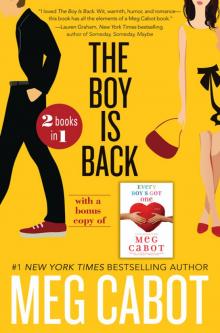 The Boy Is Back + Every Boy's Got One Bundle
The Boy Is Back + Every Boy's Got One Bundle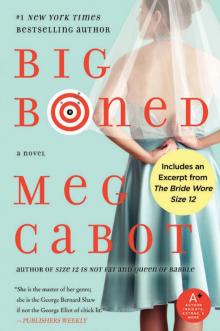 Big Boned
Big Boned Awaken
Awaken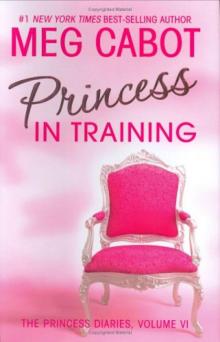 Princess in Training pd-6
Princess in Training pd-6